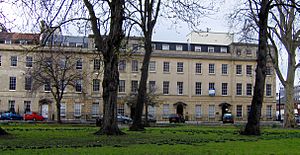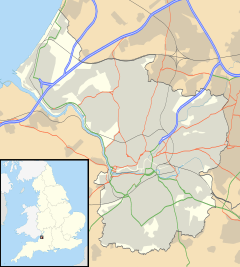Portland Square, Bristol facts for kids

North side
|
|
| Location | St Paul's, Bristol, England |
|---|---|
| Coordinates | 51°27′41″N 2°35′10″W / 51.4615°N 2.5861°W |
Portland Square is a historic square in the St Paul's area of Bristol, England. It was designed in the early 1700s as one of Bristol's first planned neighborhoods. The beautiful St. Paul's Church is right in the middle of the square.
Many of the buildings here are 'Grade I listed'. This means they are very special and protected because of their history and design. The square also has a central garden with gates and railings that are also listed as historic.
Contents
Famous People Who Lived Here
Many interesting people have lived in Portland Square over the years.
- Edward William Godwin: He was a famous architect from the Victorian era.
- William Day Wills: He was a well-known tobacco importer and manufacturer. He lived at Number 2 Portland Square.
- Sir William Henry Wills: Later known as Lord Winterstoke, he was the first chairman of The Imperial Tobacco Company. He lived at Number 6 Portland Square in 1853.
Architecture and Buildings
Portland Square is famous for its beautiful Georgian architecture. These buildings were designed by Daniel Hague for wealthy families.
Many of the buildings have a special 'Grade I listed' status. This means they are very important historic buildings. Some of these include:
- Numbers 1 to 6
- Numbers 14 to 17
- Numbers 18 to 21
- Numbers 22 to 28
- Numbers 31 to 34
- Numbers 7 to 13
Sadly, Numbers 11 and 12 were taken down. Before they were demolished, archaeologists studied the site. They found that Number 11 was a Georgian house. Number 12 was later used as a factory for making parts for corsets.
Numbers 31 and 32 are currently in very poor condition. They are on a special list called the "Buildings at Risk Register."
Changes Over Time
Portland Square was meant to be a very fashionable place. However, other areas like Clifton soon became more popular. By the late 1800s, many small businesses were located around the square. These included shoe makers and companies that made printing supplies.
In 1916, The Salvation Army opened hostels for men and women in the area.
World War II and Its Impact
Bristol was heavily bombed during World War II. Portland Square was also affected. On December 2, 1940, a bombing raid killed 40 people nearby.
After the war, there wasn't much interest in large Georgian houses. By 1951, maps showed parts of the square were "in ruins." Later, in the 1960s, new building plans didn't help fix the damage. Luckily, Portland Square kept its railed gardens and trees. This helped it keep some of its original charm.
In 1974, Portland Square became a "Conservation Area." This meant it was protected to help preserve its history. Even so, some buildings still needed support from the wartime damage.
Modern Redevelopment
In the 1990s, Bristol's economy grew. This led to some restoration work in Portland Square. Individuals and businesses started to fix up buildings.
Some popular places opened, like Cosie's wine bar. These spots became part of Bristol's lively nightlife.
New Uses for Old Buildings
- The Pierian Centre: This training center opened in 2002 at Number 27. It closed in 2011 due to a lack of funding.
- Circomedia: In 2004, St Paul's Church reopened as Circomedia. This is a special center for circus and theatre training.
Portland Square on Screen
Portland Square has even appeared in famous TV shows!
- It was used in the BBC Doctor Who 2012 Christmas Special, "The Snowmen".
- It also appeared in the Sherlock episode "The Empty Hearse". It stood in for a street in central London.
Images for kids
 | Stephanie Wilson |
 | Charles Bolden |
 | Ronald McNair |
 | Frederick D. Gregory |




